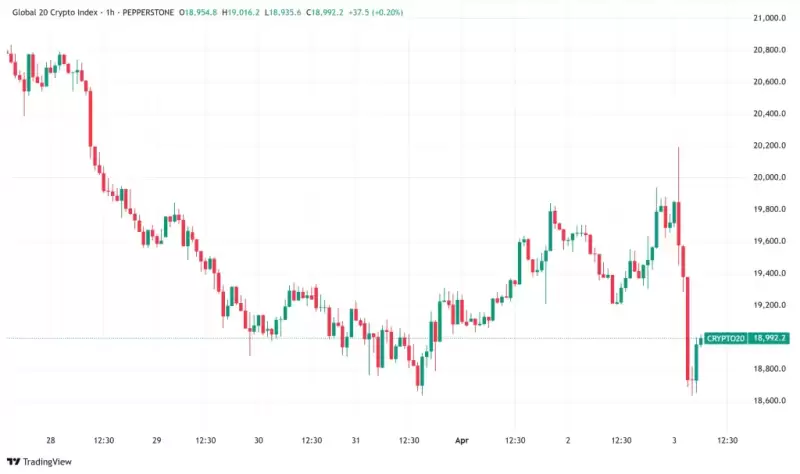 |
|
 |
|
 |
|
 |
|
 |
|
 |
|
 |
|
 |
|
 |
|
 |
|
 |
|
 |
|
 |
|
 |
|
 |
|
Cryptocurrency News Articles
China's Crypto Dominance Rings Security Bells for US
Apr 14, 2024 at 02:14 am
The rise of cryptocurrencies has brought to light potential vulnerabilities in the United States' infrastructure and national security. China's dominance in the semiconductor market, particularly in the production of ASICs for Bitcoin mining, raises concerns about the integration of Chinese-made hardware into critical American systems. The potential for malicious software or firmware in these devices could facilitate intelligence activities, potentially threatening data security and causing disruption to the financial system.

China's Dominance in Cryptocurrency Infrastructure Raises National Security Concerns for the United States
Introduction
The United States has long held a contentious stance towards Chinese technology giants such as Huawei and TikTok, citing concerns over national security and infrastructure vulnerabilities. These concerns have now extended to the realm of cryptocurrencies, as the proliferation of Bitcoin mining operations in the US raises questions about the potential for foreign influence and espionage.
China's Ascendance in Cryptocurrency Mining Hardware
Bitcoin mining, the process of verifying transactions and creating new currency units, relies heavily on specialized computer hardware known as ASICs (application-specific integrated circuits). China has emerged as a dominant force in the production of these chips, with leading manufacturers such as Bitmain based in the country. Chinese companies control over 98% of the ASIC market, giving them significant influence over the global cryptocurrency mining industry.
Security Risks Posed by Chinese-Dominated Mining Infrastructure
The growing presence of Chinese-controlled Bitcoin mining facilities in the US poses several security concerns. These facilities, often equipped with technology developed by Chinese companies, have the potential to facilitate intelligence activities, including data gathering and cyber-espionage against critical American infrastructure. Additionally, the inherent technological complexity of mining equipment raises the risk of backdoor vulnerabilities that could allow for the surreptitious transmission of data or even sabotage.
Impact on American Monetary System
The increasing adoption of Bitcoin and other cryptocurrencies highlights their growing importance to the American financial system. With 40% of American adults now holding cryptocurrencies and the mining industry projected to grow at a rate of 9% per year, any disruption to this sector would have far-reaching consequences. The reliance on Chinese suppliers to validate Bitcoin transactions poses a significant risk, especially during periods of geopolitical tension.
Mitigating the Risks
To address these concerns, experts and policymakers are calling for swift and decisive action from American lawmakers. The proposed measures include:
- Strengthening Cybersecurity Regulations: Implement strict cybersecurity standards for mining operations, including mandatory penetration testing and vulnerability assessments.
- Increasing Transparency in the Supply Chain: Promote transparency throughout the supply chain to ensure the authenticity and provenance of mining hardware and software.
- Thorough Background Checks on Investors: Conduct comprehensive background checks on investors in mining operations to identify potential risks and mitigate foreign influence.
- Creating Global Standards for Security: Foster international cooperation to establish global standards for addressing security concerns that transcend national borders.
- Developing a Robust American Mining Hardware Market: Invest in domestic manufacturing of mining semiconductors through initiatives such as the CHIPS Act to reduce reliance on foreign suppliers.
Conclusion
China's dominance in the production and supply of cryptocurrency mining hardware raises significant national security concerns for the United States. To mitigate these risks, American policymakers must take swift and comprehensive action to strengthen cybersecurity, increase supply chain transparency, conduct thorough background checks, and foster international cooperation. By developing a robust American market for mining hardware, the United States can safeguard its critical infrastructure, protect its financial system, and maintain national security in the digital age.
Disclaimer:info@kdj.com
The information provided is not trading advice. kdj.com does not assume any responsibility for any investments made based on the information provided in this article. Cryptocurrencies are highly volatile and it is highly recommended that you invest with caution after thorough research!
If you believe that the content used on this website infringes your copyright, please contact us immediately (info@kdj.com) and we will delete it promptly.
-

-

- Daily Crypto Signals: Bitcoin Tumbles from $88.5K, XRP Awaits Ripple Effects of New Trump Tariffs
- Apr 03, 2025 at 10:30 am
- The cryptocurrency market displayed a mixed landscape on April 2nd, 2025, as Bitcoin, Ethereum, XRP, and other altcoins grappled with the ripple effects of newly announced US tariffs
-

-

-

- Bitcoin (BTC) ETFs Extend Losing Streak With $158M Exit, Marking Three Straight Days of Declines
- Apr 03, 2025 at 10:20 am
- The bleeding continued for bitcoin ETFs on the first day of April, with a 3rd straight day of outflows. The hefty $157.64 million exit reinforced bearish sentiment in the crypto ETF space.
-

-

-

-

- Fidelity Investments introduces an individual retirement account (IRA) that permits private investors to invest in cryptocurrencies
- Apr 03, 2025 at 10:10 am
- According to the company's website, investors can add virtual assets to their retirement portfolio through Fidelity Crypto for IRAs. However, only Bitcoin, Ether, and Litecoin are the assets available now.




























































